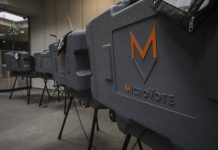In the late 1960s, people didn’t talk about cancer. Columbus resident Mary Lu Orr found out firsthand.
When the then 34-year-old was diagnosed with breast cancer she learned that, above all, outlook is everything — even in the face of societal silence.
“My goals were to live because I had too much to live for and I had responsibilities,” she said. “I come from that old time thing that my parents really instilled in me that you have to carry out what you need to do.”
And that is precisely what she did.
Orr said her late husband, Thomas, discovered the lump in her left breast shortly after New Year’s Eve in 1968. She immediately scheduled an appointment with her doctor, who saw her within a couple of days and performed a biopsy. The suspicious mass was determined malignant.
“It is so frightening because you are tempted, at first, to think of it as a death sentence,” Orr said. “I had little kids and my thought was what if I was not able to see them grow up?”
Doctors gave Orr a choice between going home and going ahead and taking care of it — meaning removing her breast. Without hesitation, Orr opted for surgery.
“I didn’t blame anything or try to find something to blame it on,” she said. “I thought to myself, ‘If you have to lose something on your body that is the easiest thing to get along without.’ I think I just got along on an even keel.”
By Jan. 8, 1969, Orr underwent a modified radical mastectomy. While on the table, Orr said she was given a chemotherapy infusion that left her feeling quite ill when she awoke.
After her discharge, Orr returned home to recuperate. Her father, the late J.W. Kolb, came to stay with Orr and her husband to help with the children.
Orr said her children were so young at the time that they didn’t understand what was going on other than that their mother didn’t feel well.
The avid gardener said she didn’t feel much different other than it took a while for her body to heal from the surgery, but she was able to stay occupied during those months.
The downstairs of her home was unfinished, she recalled, so her father set up shop and that was where she would while away the days helping him refinish furniture.
“That was fantastic therapy,” she said.
Orr, a retired school teacher, said the support she received from close friends and family was fabulous, but admitted that having cancer — let alone talking about it openly — was considered taboo.
You were oftentimes met with curious glances and hushed whispers when in public, Orr said.
“People didn’t talk about it,” Orr added. “People knew of three well-known women in town who had cancer, but they didn’t want to talk about it.”
Over the following months, Orr received no additional follow-up treatment as is standard procedure today, she said. She did undergo close monitoring, precautionary scans and testing every five years, and annual mammograms on her right breast for several years.
“After five years, they said, ‘You are extremely unlikely to have anything to follow that occurrence,’” Orr said.
The main post-operative dilemma she faced was getting a prosthetic. Not only were they not advertised, but their manufacturers and sellers were difficult to find. And Orr’s doctors had no idea where to send her to get one locally.
A few months after surgery, Orr accompanied her husband on one of his business trips to New York City. While he attended a meeting, Orr went on a search for a prosthetic breast.
“I ended up going down in the garment district,” she said. “As they fitted me, it was surreal.”
As medical techniques were in their infancy compared to today, Orr said she never considered having reconstructive surgery on her left breast.
“At that time it wasn’t very convincing and it wasn’t done well,” she said.
Around 1970, Orr said she experienced a scare when she felt what she thought to be a lump in her right breast. She returned to the doctor, but was told it was nothing and she was fine.
“From what I had heard it is like that with cancer patients,” Orr said. “A lot of the time you are so glad you’re alive and about two years later you get a scare. It is a psychological thing.”
Nearly 50 years later, Orr said cancer is no longer a thought, but she certainly understands the fear.
She shies away from offering words of wisdom or advice to those whose lives are affected by cancer because she thinks no two situations are the same. But she does offer some words of encouragement to those whose lives are affected by cancer.
“You have to continue to be hopeful and occupied,” she said. “Outlook is everything. You have to be positive and engage in positive self talk.”
[sc:pullout-text-end][sc:pullout-title pullout-title=”Colors for a Cure” ][sc:pullout-text-begin]
Who: Mary Lu Orr
Occupation: Retired teacher
Age: 83
Resides: Columbus
Type of Cancer: Breast cancer
Treatments: Modified radical mastecctomy and chemotherapy
Family: Husband, Thomas (deceased); sons, Daniel and David
Words of encouragement: “You have to continue to be hopeful and occupied. Outlook is everything. You have to be positive and engage in positive self talk.”
[sc:pullout-text-end]





